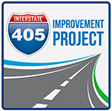All vehicles, including motorcycles, must have a transponder in order to use the 405 Express Lanes. Per the toll policy, motorcycles are allowed free travel at all times and are eligible for the Special Access account.
The questions and answers below provide current information on the project to improve Interstate 405 (I-405) in Orange County from State Route 73 to Interstate 605.

Traffic along the corridor is expected to grow approximately 35 percent by 2040. Improvements are needed to enhance traffic flow, accommodate growing traffic demand, relieve congestion, and improve overall mobility. The I-405 Improvement Project is critical in order to accommodate expected employment, population and housing growth in not only Orange County but throughout Southern California.
There are seven access points in between SR-73 and I-605, giving drivers sufficient opportunity to reach every interchange and business along the corridor, including the Westminster Mall, car dealerships, Bella Terra, Goldenwest College and South Coast Plaza, and any other destination.
These intermediate access locations minimize right of way impacts to the adjacent community. Additional access points would likely have significant right of way impacts.
The intermediate access points at Magnolia/Warner and Bolsa/Goldenwest were selected largely to serve Beach Boulevard which is roughly midway along the corridor, has the highest arterial volume of any of the arterials crossing the freeway, and has the largest interchange volumes in the corridor.
405 Express Lanes intermediate access locations. Click to enlarge map.
The Express Lanes, and other project improvements, benefit all people who use the I-405. Rush-hour commutes in the regular lanes on I-405 are expected to be reduced by almost 30 minutes versus only building one regular lane in each direction. The bottom line is you don’t have to pay one penny more and you’ll be home to your family a half-hour sooner.
The OCTA Board of Directors (Board), which is leading the freeway improvement project, voted to adopt a number of goals that would guide the development and implementation of the 405 Express Lanes toll policy. The goals focus on providing express lanes customers with a reliable commute while optimizing the number of cars that can utilize the lanes at free-flow speeds, and encouraging ridesharing and transit use.
The complete list of board-adopted 405 Express Lanes goals:
- Provide express lanes customers with a safe, reliable, predictable commute.
- Optimize throughput at free-flow speeds.
- Increase average vehicle occupancy.
- Balance capacity and demand to serve customers who pay tolls as well as people who rideshare or use transit.
- Generate sufficient revenue to sustain the financial viability of the express lanes.
- Ensure all covenants in the financing documents are met.
- Ensure any potential net excess toll revenues are used for Interstate 405 corridor improvements.
The 405 Express Lanes will use congestion management pricing. This type of pricing was pioneered on the 91 Express Lanes, also operated by OCTA.
Congestion management pricing is designed to optimize express lanes traffic at free-flow speeds. To accomplish this OCTA monitors hourly tra¬ffic volumes. Tolls are increased when traffic volumes consistently reach a trigger point where traffic flow can become unstable. If traffic drops below the optimal traffic volume, tolls are lowered to encourage usage.
The tolls can vary by hour, day of the week and direction of travel. Traffic volumes are continuously monitored and if warranted, tolls are adjusted quarterly. This approach balances traffic engineering with good public policy and gives customers an opportunity to know the toll price before they make their trip.
Toll Policy405 Express Lanes |
Solo Drivers |
2 Person Carpools |
3+ Person Carpools |
|---|---|---|---|
| Toll | Toll | Free | |
| Non-Peak Hours | Toll | Free | Free |
| Toll | Toll | Free | |
| Non-Peak Hours | Toll | Toll | Free |
Toll Policy
405 Express Lanes
Solo Drivers
2 Person Carpools
3+ Person Carpools
Contact the 405 Community Outreach Team
If you have questions, please contact the Outreach Team by calling (888) 400-8994.
Para obtener más información sobre el Proyecto de Ampliación en el I-405, llame al (888) 400-8994.
Để biết thêm thông tin về Dự Án Cải Thiện Xa Lộ I-405, xin vui lòng liên lạc cô Gia Lý theo đường dây tiếng Việt (888) 662-6569.